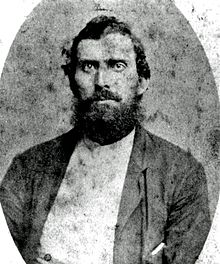Free State of Jones, directed by Gary Ross, opens here in NYC on June 24th.* Among others as protagonists it features Newton Knight, played by Matthew McConaughey, a rare white ally down there in Mississippi n the days after the Surrender at Appomattox, Reconstruction and Jim Crow.
The other day, after writing about my struggles with attempting to write accurately, vividly and accessibly to the events and arcs of what happened in the South and with our history after the Surrender, I mentioned the stereotype of the vile "carpetbagger." Someone inquired whether that image of hatred was an historical one or merely created in our national consciousness by Margaret Mitchell in the course of her Gone With the Wind. It was indeed an historical fact that such figures were vilified throughout the nation after the War, south and north.
 |
| Newton Knight |
The Free State of Jones -- about which more than one book of history has been written, illuminates one of the rare aspects of Reconstruction that created such figures. The way Newt Knight was regarded and treated by white Southerners, first because he didn't believe in secession, and second because of his way of living with African Americans as if they were as good as he was, put his neighbors into a frenzy. So imagine, how these people felt about northerners coming on down and -- if not directly working for the betterment of African Americans' futures, making a profit out of what the South had squandered. Fortunately for Newt Knight, his family and this story, Newt had a gun, was not ever intimidated into not using it, and was a crack shot.
" While Knight is a hero, Mr. Ross said emphatically, he is not a white savior of African-Americans, but a white ally.I think we need to celebrate alliances,” he said. “And it is demonstrably true that Newt was allied with African-Americans all through Reconstruction after a lot of white people in the South had bailed.”
In carrying the Newton Knight story through the violent rollback of the promise of Reconstruction, Mr. Ross is taking on the negative image of the period driven deep into American consciousness by films like “Gone With the Wind” and D. W. Griffith’s “The Birth of a Nation,” as well as the Lost Cause nostalgia that has infused many movies since.
“This is not your granddaddy’s Civil War movie,” said the Yale historian David Blight, one of 11 historical consultants listed prominently in the closing credits. “It doesn’t in any way sentimentalize any element of the Confederate cause. Quite the contrary.”
| Film, Free State of Jones, with Mahershala Ali and Michael McConaughey in the foreground. |
FOREWORD
We felt it was important in an historical movie, especially a movie about such a crucial time in history, for the audience to know what was true and what was fictionalized, even if it was based on underlying source material.
In this site you will be able to navigate through the entire movie, click the areas that interest you, and see a brief explanation of the historical facts that informed the screenplay. If you are more curious about that part of the movie, we have footnoted the paragraph to see sources on which it is based. But footnotes themselves can be misleading, so if you want to see the entire primary source, you can click again and be transported to the original document. We hope this is helpful, maybe even fun. Some things need to be invented in a movie, but most things in Jones were not. I think it’s only right that you be able to tell which was which.The NY Times has an article about the director and Free State of Jones on its site, here.
The Youtube video trailer isn't listed as for sharing, but can viewed here. It's powerful stuff.
------------------------------------
* This is one of the two films I am planning to see this summer in a theater. The other is, natch, Ghostbusters. The Free State of Jones we'll see at a special screening occasion; at Ghostbusters we'll just be two average movie goers on hopefully opening day.

No comments:
Post a Comment